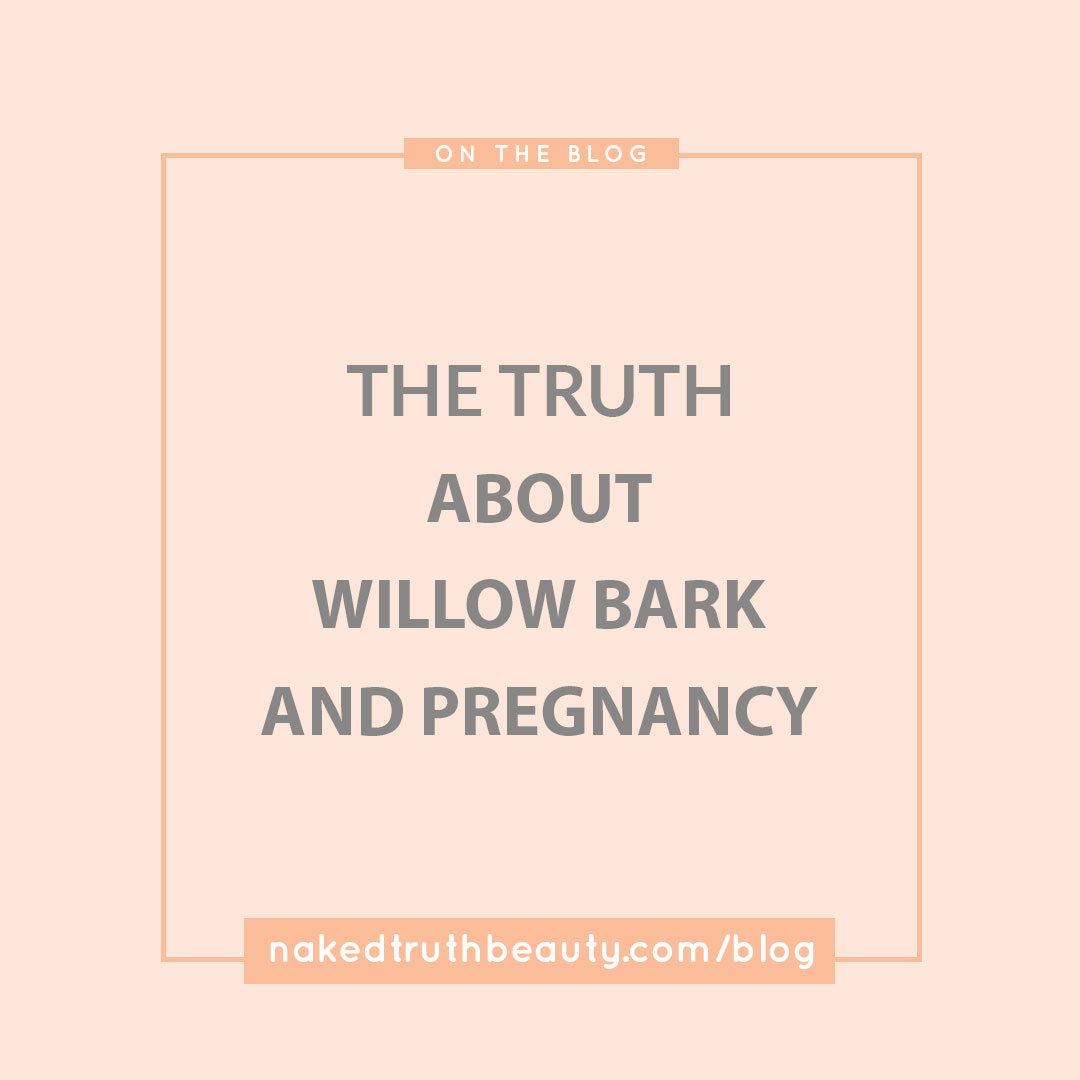The Truth about Willow Bark and Pregnancy
A brief aside before we get started: I'm not here to freak you out. I only want to help others avoid the anguish I went through of assuming something was safe, and finding out later that this assumption was not entirely true.
I'd been on the clean beauty bandwagon for a long time by the time I got pregnant, so when I saw that "positive" test (aww!), I didn't feel any urge to rush and change my products. I thought I'd already been through that circus. I did cool it on the essential oils, as many of them are restricted for pregnancy (more on that later), but other than that, I assumed it was business as usual.
Hubris.
What I soon realized was that I'd managed to overlook a sneaky skincare ingredient – which shouldn't be used in pregnancy – that parades under a "natural" name in green products, but is very similar to an ingredient that bears a scientific name in "traditional" products.
I'm talking about Willow Bark and Salicylic Acid.
With the clean beauty movement, we've (purposefully or not) created this bias that "natural = safe" and "synthetic = use with caution." While common (guilty!), this bias is not accurate! In fact, many of the "chemical"* ingredients that have scary or unfamiliar names are derived from natural sources. Salicylic acid is an excellent example, as it (originally, anyway) comes from – you guessed it – willow bark.
What's the Difference between Salicylic Acid and Willow bark?
Salicylic acid (a component of aspirin) is one of the most popular beta hydroxy acids (BHAs) in skincare due to its anti-inflammatory (again, like aspirin) and exfoliating properties, and is particularly recommended for oily and acne-prone skin.1 However, it's rated a 4 (too far into the yellow for my personal taste) on EWG's Skin Deep database due to concerns of multiple, additive exposures, irritation, and enhanced skin absorption.2 Another drawback is that a common side effect of salycilic acid is dry, peeling, red skin. Many of us have been there. It's also possible to have a more serious reaction to the ingredient (get medical help right away), and people with allergies to nonsteroidal anti-inflammatory drugs should definitely steer clear.1**
To mitigate concerns of salicylic acid while still reaping the skin clearing benefits, many natural skincare brands have turned to willow bark, a close relative.
To be clear, "willow bark" and "salicylic acid" are not the same thing. Rather, when ingested, the body converts the salicilin contained in willow bark to salicylic acid, but this requires complex functions of the human digestive system that the skin does not do.3 Because they're not the same, the benefits are different. Willow bark is not as strong of an active ingredient as salicylic acid, but it does retain aspirin-like qualities, specifically anti-inflammatory properties.
Why do we care?
Topical application of salicylic acid is cautioned against during pregnancy (or if you plan to become pregnant) because it's an ingredient in aspirin, which is generally advised against during pregnancy due to risk of miscarriage, congenital defects, and other complications when taken in high doses.4**
When I was doing research about pregnancy acne in my first trimester (check out my favorite non-toxic acne + scarring DIY recipe) and came across the recommendation to avoid salicylic acid even in topical applications, at first I didn't think anything of it because I wasn't using anything that had those words – "salicylic acid"– on it. Then I realized I had an awful lot of willow bark going on, made the connection between the two ingredients, and the guilt and horror set in. Of course, I stopped using those products immediately, but the panic was still there.
Skip ahead to a couple rabbit holes later (which included talking to my midwife), and I'm less freaked out. I don't love it, but the panic has calmed.
The studies that demonstrated adverse outcomes in pregnancy focus on the ingestion of salicylic acid, rather than topical application. I take comfort in knowing it took high quantities of ingested salicylic acid to cause problems, but I still can't feel great about exposing my baby to it at all. As we know, things we put on our bodies are absorbed into our bodies. Unfortunately, no studies have been conducted on the topical application of salicylic acid during pregnancy, so we simply don't have the data to know for sure how much of a risk it is.5 However, if you know me, you know I take a better-safe-than-sorry approach to personal care and don't like the idea of absorbing something into my skin that is potentially harmful if ingested. Regardless of what you and your doctor decide on salicylic acid and willow bark in your daily skincare routine, avoid salicylic acid peels, as this greatly enhances absorption.6
Despite the fact that willow bark is not full-blown salicylic acid but is only potentially problematic due to its aspirin-like composition, I opted to avoid it (after I realized my blunder, obviously). If you've been using salicylic acid or willow bark, don't panic. As with anything, I'd recommend talking to your doctor before continuing use.
*By the way, "chemical" simply means that it's "a form of matter that has constant chemical composition and characteristic properties." Nothing about harm or anything scary.
** I am not a doctor! Aspirin may be prescribed by your doctor in low doses for certain conditions. This post and website do not constitute medical advice. Please see full Terms of Use.
- WebMD. (n.d.) Salicylic acid gel. Retrieved from https://www.webmd.com/drugs/2/drug-18-193/salicylic-acid-topical/salicylic-acid-for-acne-topical/details
- Salicylic acid. Environmental Working Group Skin Deep Database. Retrieved from https://www.ewg.org/skindeep/ingredient/705746/SALICYLIC_ACID/#.WnFBTZM-fdR
- Vlachojannis, J., Magora, F., & Chrubasik, S. (2011). Willow species and aspirin: different mechanisms of action. Phytother Res., 25(7):1102-4. doi: 10.1002/ptr.3386. Retrieved from https://www.ncbi.nlm.nih.gov/pubmed/21226125
- Tobah, Y. B. (29 October 2015) Is it safe to take aspirin during pregnancy? Mayo Clinic. https://www.mayoclinic.org/healthy-lifestyle/pregnancy-week-by-week/expert-answers/aspirin-during-pregnancy/faq-20058167
- Bozzo P. et al. 2011. Safely of skin care products during pregnancy. Canadian Family Physician; 57(6). http://www.ncbi.nlm.nih.gov/pmc/articles/PMC3114665
- BabyCenter. (2016). Safe skin care during pregnancy. BabyCenter. Retrieved from https://www.babycenter.com/0_safe-skin-care-during-pregnancy_1490031.bc
- Hale, Bob (2013-09-19). Necessary Beings: An Essay on Ontology, Modality, and the Relations Between Them. OUP Oxford. ISBN 9780191648342. Archived from the original on 2018-01-13. Chemical substance





